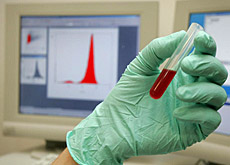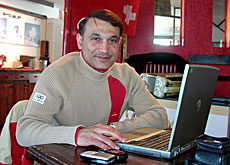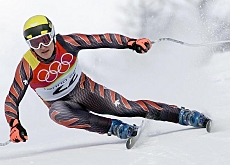Key role for Swiss in Olympics doping checks

Swiss scientists are testing blood samples during the Turin Olympics on behalf of the World Anti-Doping Agency (Wada).
The tests form part of the more than 1,000 checks for banned substances being carried out during the Games.
While urine samples are being analysed by Italian experts, scientists at the Lausanne-based doping analysis laboratory are responsible for blood testing on athletes. In total 50 analysts will work night and day on the samples.
The Swiss team, led by Martial Saugy, is based at a Turin hospital centre and is working closely with an Italian laboratory.
At the opening ceremony the president of the International Olympic Committee (IOC), Jacques Rogge, called on athletes to “compete in a spirit of fair play, mutual understanding and respect, and above all, to compete cleanly by refusing doping”.
But just six days after the first Olympic event, the IOC announced the first positive test for a banned substance.
The Russian biathlete Olga Pyleva was stripped of her silver medal and excluded from further competition as stringent anti-doping checks came into effect.
Good reputation
The Swiss laboratory is attached to the Lausanne University institute for forensic medicine.
Saugy said the fact that his team had been asked to analyse tests showed that their reputation in the field had been established.
“It is recognition of the work carried out over a number of years by our laboratory,” the biologist told swissinfo.
But Saugy said that while it was the Wada’s decision to call in Swiss help, this had to be agreed with the Turin Games organisers, Toroc, and the IOC.
“The decision to send a foreign team to the Olympic venue was not readily accepted by the Italian government and Toroc,” he said.
“The IOC normally only deals with the one doping body selected by the organisers,” Saugy said, adding that his colleagues from the Italian laboratory had been very cooperative and had made sure the Swiss were accepted in Turin.
Samples
Under Italian law, the samples cannot be sent to Switzerland for analysis. The Swiss laboratory was obliged to prove that it would obtain the same results from testing in Turin as it would at home.
Another problem was that the equipment needed for the testing had to brought into Piedmont at the expense of the Lausanne laboratory.
Eight Swiss analysts are working on the project, which will earn the Lausanne laboratory around €100,000 (SFr156,000).
“We aren’t here for the money,” concluded Saugy. “Rather we’re here for the challenge and the important contacts we can make. What’s more, being accredited to the Games is great publicity for us.”
swissinfo, Mathias Froidevaux
The International Olympic Committee and the Italian authorities originally disagreed over the doping issue. The IOC wanted doping cases to be given sport-based punishments, but Italy considers it a crime and therefore subject to penal law.
A compromise was found for the Games: the IOC is in charge of the tests, but anyone found guilty of doping will be dealt with by the Italians.
The World Anti-Doping Agency appointed the Swiss doping analysis laboratory to carry out the blood tests. Urine samples are being analysed by Italian experts in Rome.
Eight Swiss analysts are working on the blood tests for the Winter Olympic Games.
More than 1,000 blood and urine tests will have been carried out by the end of the Games.
Four years ago at the Salt Lake City Games the International Olympic Committee recorded seven positive tests.

In compliance with the JTI standards
More: SWI swissinfo.ch certified by the Journalism Trust Initiative


You can find an overview of ongoing debates with our journalists here . Please join us!
If you want to start a conversation about a topic raised in this article or want to report factual errors, email us at english@swissinfo.ch.